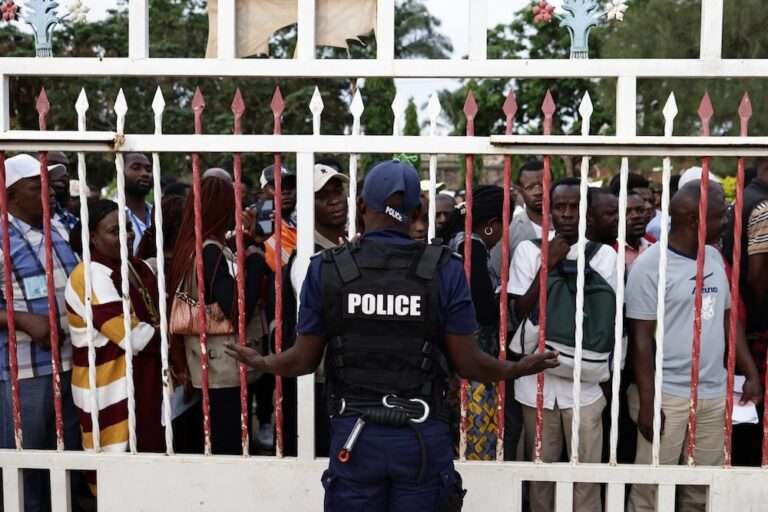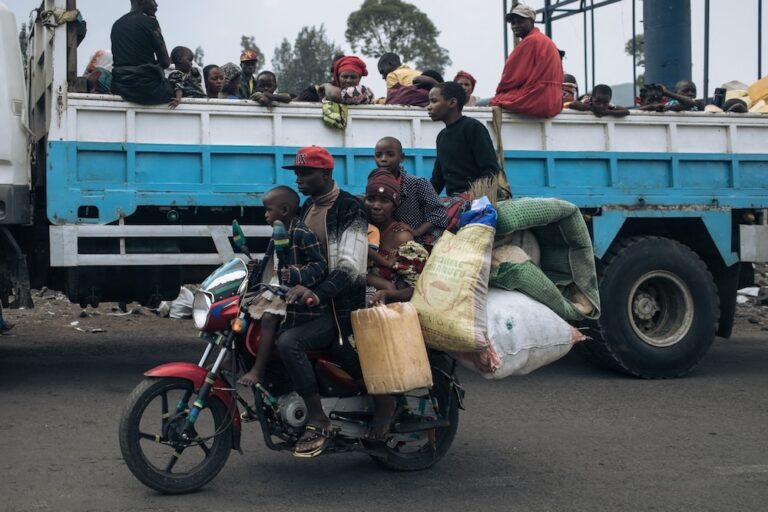(RSF/IFEX) – Reporters Without Borders has hailed the restraint shown by the High Authority for the Media (HAM) in imposing no more than a 24-hour closure on three TV stations as a punishment for “repeatedly broadcasting shocking and highly emotional pictures” and inciting “the security forces and the population to take revenge.” The three stations […]
(RSF/IFEX) – Reporters Without Borders has hailed the restraint shown by the High Authority for the Media (HAM) in imposing no more than a 24-hour closure on three TV stations as a punishment for “repeatedly broadcasting shocking and highly emotional pictures” and inciting “the security forces and the population to take revenge.”
The three stations affected by the enforced closures, announced on 16 August 2006, were Channel 1 of the state-owned Congolese National Radio-Television (Radio Télévision Nationale Congolaise, RTNC1) and two privately-owned local stations, the pro-government Radio-Télévision Armée de l’Eternel (RTAE) and the opposition Canal Congo Television (CCTV).
“The HAM gave a measured and creative response to news media that were whipping up the supporters of the two main candidates prior to the national election results,” Reporters Without Borders said. “We rarely welcome the closure of news media, even when temporary, but the dangerous tendency displayed by certain Congolese TV stations of throwing oil on the fire seemed to require a moderate sanction.”
The press freedom organisation added: “We again appeal to the Congolese journalistic community to scrupulously respect the principles of professional conduct on the eve of the announcement of the election results.”
The three stations suspended their broadcasts in response to the HAM order. “CCTV and RTAE suspended their signals at 05:00 (04:00 GMT) on 17 August and RTNC1 finally complied with the order at 08:30 (07:30 GMT)”, HAM chairman Modeste Mutinga told AFP, condemning the “excessive politicisation” of the local media and the failure of journalists to behave professionally.
Donat M’Baya Tshimanga, the president of the Congolese press freedom organisation Journalist in Danger (Journaliste en danger, JED), told Reporters Without Borders: “Everyone here agrees with this decision by the HAM, which accurately targeted the guilty media. For weeks, these stations have repeatedly broadcast footage of horrific acts supposedly committed by the supporters of the two leading presidential candidates, President Joseph Kabila and Vice-President Jean-Pierre Bemba, with the evident aim of paving the way for clashes a few days in advance of the announcement of provisional results.”
RTNC1, which is government-run, and RTAE, which is owned by Pastor Sony Kafuta, a Kabila supporter, repeatedly screened footage of policemen being lynched and torched during demonstrations on 27 July that accompanied a Bemba election rally. CCTV, which is owned by Bemba, responded by showing footage of government forces bombing the population of Equateur province during the 1998 war and police firing teargas grenades at the supporters of an opposition party during the funeral of journalist Bapuwa Mwamba in July.
William Swing, the Special Representative of the UN Secretary-General in the Democratic Republic of Congo, has meanwhile voiced deep concern about the hate messages being broadcasted by some local media calling on the population to take revenge on “whites and foreigners.”


